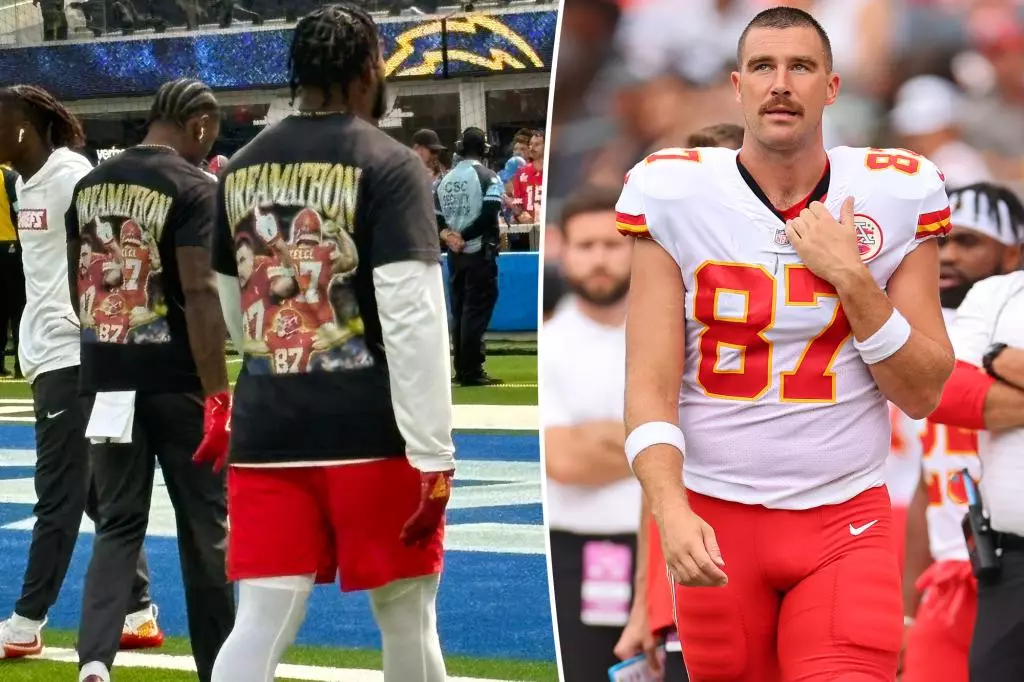The Kansas City Chiefs, a team renowned for their camaraderie and resilience, recently showcased a compelling display of unity that went beyond the confines of the football field. As a response to public scrutiny aimed at star tight end Travis Kelce, the team’s wide receivers—Rashee Rice, JuJu Smith-Schuster, and Mecole Hardman—donned custom T-shirts displaying Kelce’s name before their pivotal clash with the Los Angeles Chargers. This act of solidarity speaks volumes about team dynamics and the often overlooked emotional labor in professional sports.
In the world of professional sports, individual performance is frequently scrutinized and held to a standard that can be both stressful and unforgiving. The recent outpouring of support for Kelce from his fellow players demonstrates a profound respect for not only his role on the team but also for his leadership qualities. According to CBS Sports reporter Tracy Wolfson, it was Rice who took it upon himself to buy custom shirts for his teammates, a testament to Kelce’s mentorship and influence. By wearing these T-shirts, the wide receivers were not just making a fashion statement; they were actively pushing back against external criticism while reinforcing their collective identity.
Kelce’s name, emblazoned in bold Chiefs colors alongside various depictions of him in action, symbolizes more than just an athlete’s brand—it’s a representation of the bond between players. The choice of “Dreamathon” on the back further reflects an entrepreneurial spirit often underlying team dynamics, where personal branding and collective identity converge. This sense of unity has proven essential in overcoming adversity, not just in terms of gameplay, but in the personal lives of the athletes as well.
The criticism directed at Kelce has intensified in recent weeks, especially as he juggles the pressures of fame, media attention, and elite performance. Todd McShay’s comments, suggesting that Kelce’s celebrity lifestyle might be affecting his on-field performance, exposed a harsh reality of professional athletes: their lives are often dissected by public opinion that does not account for the complexities of their realities. McShay’s assertions hint at an uncomfortable truth; professional athletes are expected to maintain peak performance despite an array of distractions, both personal and professional.
This scrutiny becomes even more acute when juxtaposed with Kelce’s well-publicized relationship with pop superstar Taylor Swift. The added spotlight that comes with such a relationship can distort public perception and amplify any perceived shortcomings in performance. By framing his recent performances as evidence of distraction, critics paint a simplistic picture that fails to acknowledge the multifaceted pressures placed upon modern athletes.
Kelce’s Response to Criticism
In response to the ongoing dialogue surrounding his performance, Kelce took to his podcast—“New Heights”—to address critics head-on. Acknowledging that he needs to “play better football,” Kelce’s candidness reveals a level of self-awareness that is often rare in professional sports. His reflections on key moments in games, including a critical drop in a recent match, highlight the internal pressures athletes place upon themselves, alongside the external expectations.
Kelce’s sentiments—that everyone, including himself, has room for improvement—echo a larger theme within sports culture: accountability. In an age where social media can amplify flaws and magnify failures, acknowledging these shortcomings openly may serve as a strategy for maintaining personal integrity and team morale. The challenges he faces are not merely professional hurdles; they resonate as part of the larger human experience of dealing with criticism and the demand for excellence.
The Kansas City Chiefs’ recent gesture of support for Travis Kelce encapsulates the intricate balance of personal and professional lives that athletes must navigate. While public expectations pressure athletes to perform flawlessly, the significance of team solidarity cannot be overstated. As Kelce and his teammates face scrutiny, the resilience they demonstrate through camaraderie highlights the essential role of support systems in professional sports. Moving forward, it remains to be seen how these dynamics will evolve, but one thing is clear: in the high-stakes world of the NFL, the ability to rally behind one another is as crucial as the game-winning touchdown.

